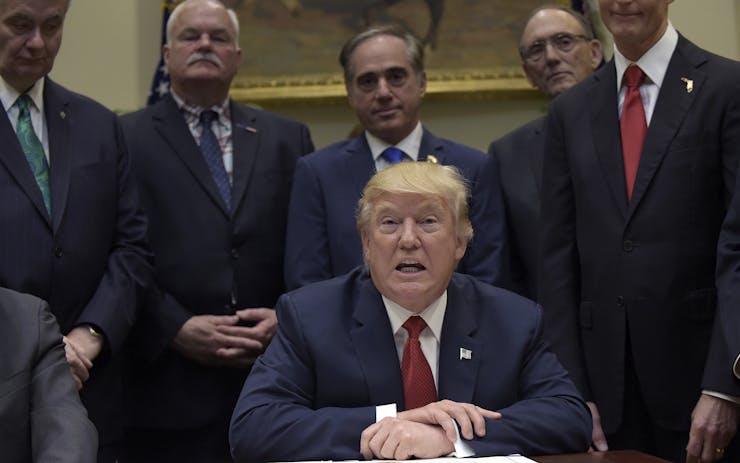US News
California
Assembly Bill 1578 successfully cleared a committee vote, 5-2, and will now move to the full Assembly floor. The bill, authored by Assemblyman Reggie Jones-Sawyer (D-Los Angeles), is designed to protect Californians who are operating lawfully under California cannabis laws. Absent a court order, it says, local and state agencies, including regulators and law enforcement, shall not assist in any federal enforcement actions against state-authorized cannabis activity.
“AB 1578 is intended to prevent federal government overreach in the era of Trump,” said Lynne Lyman, Drug Policy Alliance’s California director, testified at Tuesday’s committee hearing. “We do not want the federal government harassing, intimidating, or prosecuting people who are operating lawfully under state law.”
Also having its first hearing Tuesday was Senate Bill 180, by Sen. Holly Mitchell (D-Los Angeles), which cleared the Senate Public Safety Committee on a 5-2 vote. Dubbed the RISE (Repeal of Ineffective Sentencing Enhancements) Act, Mitchell’s bill would repeal the three-year sentencing enhancements that are tacked onto new drug-possession convictions for past drug convictions. These enhancements are the leading cause of long sentences that create crisis-level overcrowding in county jails.
Meanwhile, as the state gears up to open adult-use markets next year, a California Supreme Court committee is advising judges in the Golden State to stay away from investments in cannabis businesses. The court’s Committee on Judicial Ethics Opinions said Wednesday that maintaining any interest in a business that involves medical or adult-use cannabis is incompatible with a judge’s obligation to follow the law. That’s because marijuana remains illegal under federal law despite its growing acceptance among states. According to its opinion, Maryland, Washington and Colorado also prohibit judicial involvement with marijuana.
Colorado
Three months in and the Trump administration has yet to articulate even a cursory cannabis policy. That’s frustrating to many in legal states, and one lawmaker is now addressing the president personally. “It’s about time our president tells us where exactly he stands on marijuana,” Congressman Jared Polis (D-Boulder) writes in a Denver Post op-ed. In it, Polis urges the White House to, for starters, “leave cannabis regulation to the states.” He makes a mostly dollars-and-cents argument in an apparent effort to appeal to Trump’s business background.
“Colorado has proven that allowing responsible adults to legally purchase marijuana gives money to classrooms rather than cartels; creates jobs rather than addicts; and boosts the economy rather than the prison population,” writes Polis, a member of the Congressional Cannabis Caucus.
Also in Colorado: DUI arrests fell by a third during the first quarter of the year! But the Colorado Department of Transportation is still singing a Reefer Madness tune.
Delaware
Delaware’s new Gov. John Carney can’t make it through a town hall meeting without someone raising the legalization question. He’s been peppered with questions about ending cannabis prohibition during a tour the state to discuss this year’s budget priorities. The questions ultimately prompted him to host a legalization roundtable with advocates and reform-minded legislators on April 19.
“We need our governor to do the right thing and legalize.”
“I’m glad it’s not on 4/20, because we have an event planned that day,” Delaware NORML executive director Cynthia Ferguson quipped.
Jokes aside, advocates are pressing hard. “I’m grateful the governor is willing to come on out and listen to what 61% of his constituents want to see happen,” one advocate, Kim Petters, told Leafly. “I just hope this isn’t a way to appease activists to keep us at bay another year. Legalization must happen in 2017. The cost and human toll of prohibition is just too high to wait any longer. We need our governor to do the right thing and legalize.”
Shop highly rated dispensaries near you
Showing you dispensaries nearDistrict of Columbia
Advocates in the nation’s capital are gearing up for 4/20 in the most hospitable way possible: by rolling thousands of free—free!—joints to be passed out on Capitol Hill on the high holiday. It’s a repeat of the group’s widely publicized joint giveaway on the National Mall during Donald Trump’s inauguration. That stunt, meant as a gesture of resistance, was a global media sensation.
Advocates hope to generate a similar buzz on 4/20, but there’s a serious side of the demonstration, too. A recurring federal budget amendment that protects legitimate medical cannabis businesses from DOJ enforcement actions is set to expire at the end of the month. And nothing draws attention to that deadline quite like free joints on Capitol Hill.
Florida
Cannabis decriminalization in Florida? There’s a bill for that. Given the legislation’s dim prospects, however, it’s largely symbolic, timed to drive the debate as Florida lawmakers scramble to implement the state’s young medical cannabis program.
“There have been many, many bills proposed, but it’s never had a hearing. So this is a major step forward to end prohibition,” NORML Tallahassee’s Melissa Villar told reporters. “There have been many, many bills proposed, but it’s never had a hearing. So this is a major step forward to end prohibition.”
Iowa
A wide-ranging medical cannabis bill breezed through the Iowa Senate on Monday on a vote of 45-5. That got folks wondering if Iowa’s might become the 30th next state to legalize medical marijuana. But despite the near-unanimous vote, that doesn’t look likely. The Republican-dominated House of Representatives simply isn’t there yet. Many lawmakers view the Senate legislation as too flexible and overbroad in terms of qualifying conditions.
Maryland
“The rollout so far is going well.”
Patient registration for Maryland’s medical marijuana program has begun. Roughly 1,200 patients signed up the first week, during which anyone whose last name begins with letters A-L was permitted to apply. The number of registered physicians spiked as well, and currently sits at 250. Those numbers should double quickly as registration opens the entire state on April 24.
“We are having some good numbers that are coming in,” said Patrick Jameson, executive director of the Maryland Medical Cannabis Commission. “The rollout so far is going well.”
But as the program ramps up, Maryland’s Legislative Black Caucus has issued an ultimatum to Maryland’s General Assembly: Either address the lack of diversity in Maryland’s cannabis industry or say goodbye to the support of the caucus’s 51 members.
“How can the Democratic Party pass anything in the legislature without us? How can they be successful in the next election without us?” asked Del. Cheryl Glenn, who chairs the caucus. “They won’t, unless they resolve this.”
New Hampshire
Bipartisan legislation to grant access to medical marijuana to patients with PTSD (House Bill 160) and chronic pain (HB 157) cleared important hurdles in Concord. Both bills sailed through the state’s powerful Senate Heath Committee. The PTSD bill advanced unanimously, 5-0, while the chronic pain bill legislation passed by a vote of 4-1. Both bills are sponsored primarily by Republican legislators.
Meanwhile, a measure to decriminalize small amounts of cannabis is gaining support in Concord. Even GOP Gov. Chris Sununu is on board.
Nebraska
Nebraska lawmakers should approve a measure allowing and regulating medical marijuana before voters bypass them, senators who support the bill said Wednesday. Legislators debated the bill for two hours without voting, the AP reports, and are unlikely to return to the issue this year unless supporters prove they have the 33 votes necessary to end a filibuster. Senators who oppose the measure should work on making it better because they may be running out of time to regulate medical cannabis, said Sen. Adam Morfeld of Lincoln. Voters are now circulating two petitions for cannabis-related initiatives that could appear on the 2018 ballot. One would amend the state’s constitution to give residents the right to use, buy and sell cannabis and prohibit any laws restricting it, while the other would decriminalize possession of one ounce or less of the drug.
North Dakota
A bill legalizing medical marijuana in North Dakota is on Gov. Doug Burgum’s desk. North Dakota voters overwhelmingly passed a medical cannabis referendum last November, but according to the governor, additional legislation was required.
“Without additional legislation, this would have been extremely problematic,” said Burgum, a Republican. “We’re committed to moving as quickly as we can.”
For now, North Dakota’s medical cannabis legislation does not include a home-grow component, and patients are required to take extra steps to obtain smokable cannabis.
Some advocates are giving legislators a regulators a year to get the show on the road. “If that doesn’t happen, there is going to be hell to be paid,” said Rilie Ray Morgan, who led the state’s recent referendum battle. “If it’s not available in a year, we will take people to court then. No ifs ands or buts about that.”
“If this program isn’t running smoothy and properly by then, we’ll start another petition process to address the (onerous) licensing fees the legislature added,” Ray told Leafly. He estimates it could take a prospective business as much as $2 million in initial investment just to get its doors open. “The costs of production and selling to patients will be so far out of line, that’s my fear, that patients will be priced out of the program.”
Rhode Island
Rhode Island’s Democratic Gov. Gina Raimondo isn’t ready to legalize cannabis. Not quite yet anyway. She’d rather study it first.
Tennessee
Last fall, Democratic leaders in Nashville and Memphis voted to decriminalize small amounts of cannabis. It was a widely regarded huge step forward for Tennessee’s two largest cities. That progress, however, was summarily undone by Republican lawmakers at the state level. Tennessee’s Republican Gov. Bill Haslam last week signed a bill to strike down the reforms, putting an end to Nashville’s and Memphis’s seven-month experiment.
Texas
A very limited cannabis decriminalization measure passed through the Dallas City Council last week. The law, which makes cannabis possession in Texas’s third-largest city a civil offense punishable by a citation, goes into effect Oct. 1—unless, of course, lawmakers follow Tennessee’s lead and undo the local policy.
Vermont
Ending prohibition in Vermont has been on and off the table numerous times this year. This time last week, things looked very bleak indeed. Then suddenly Twitter’s abuzz with chatter there may be a Senate legalization vote this Friday in Montpelier. Good news. The bill would then advance to the House where it would (almost certainly) languish to death. Again.
Meanwhile, one by one, Vermont’s neighbors are ending prohibition. First Massachusetts, then Maine. What’s next? Quebec? Oh wait…
West Virginia
West Virginia on Wednesday became the 29th US state to legalize medical cannabis. Give a listen to Gov. Jim Justice’s speech on the matter.
International News
Canada
The long-awaited legislation to legalize cannabis for adult use throughout Canada landed in Parliament last week, sparking mixed reactions among legalization advocates. Prime Minister Justin Trudeau has directed Liberal MP Bill Blair, who’s also Toronto’s former police chief, to shepherd the reform to fruition.
Best ETA for legal cannabis in Canada? Mid-2018. Hopefully in time for Canada Day.






